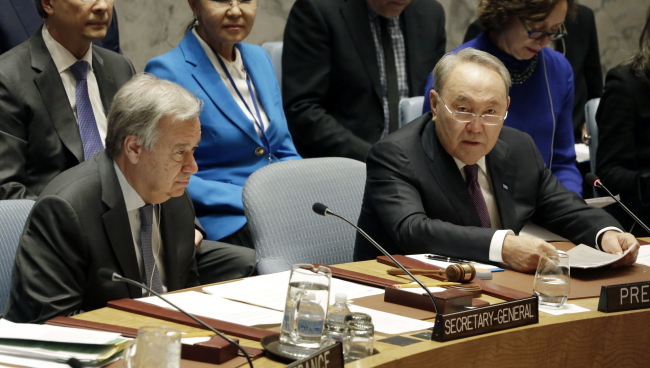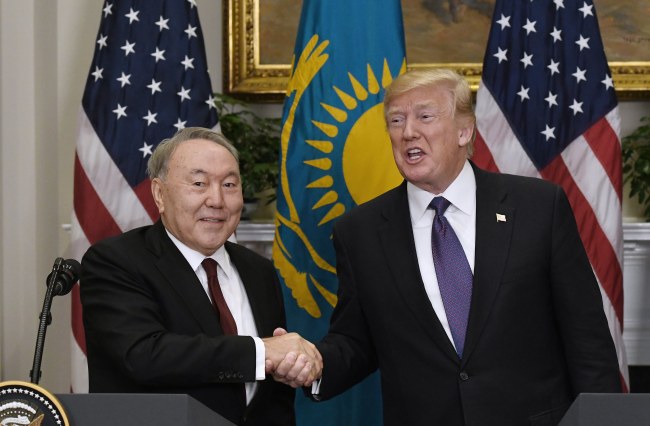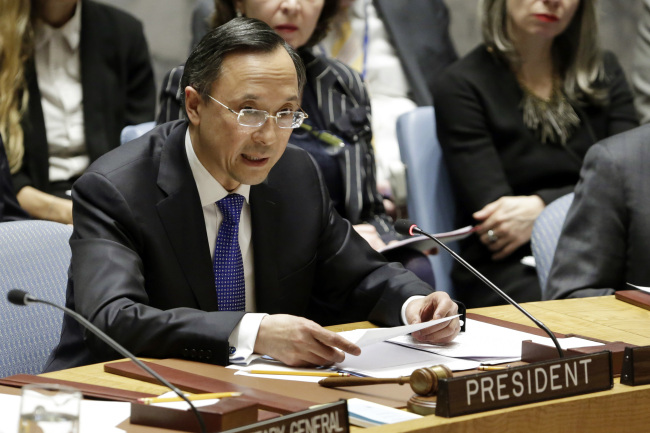Kazakhstan’s multivector diplomacy useful in disarmament, nonproliferation
“The president once remarked to me, ‘(The decision to get rid of nuclear weapons) was the best thing I ever did for our young country,’” Kazakhstani Foreign Minister Kairat Abdrakhmanov told the UN General Assembly on Sept. 21 last year.
By Joel LeePublished : Jan. 22, 2018 - 20:25
Having voluntarily renounced its atomic arsenal in 1991, Kazakhstan urges North Korea to abandon its nuclear aspirations and capitalizes on its nonpermanent membership in the United Nations Security Council for a world free of weapons of mass destruction, according to the Kazakh Embassy in Seoul.
Kazakhstan assumed the presidency of the supreme body of five permanent members -- nuclear powers the United States, Russia, China, Great Britain and France -- and 10 nonpermanent members in January. Its 2017-18 seat on the UNSC -- the world’s highest decision-making body exclusively dealing with matters of peace and security -- as the first Central Asian member is the culmination of six years of strenuous diplomacy, said Anuar Ayazbekov, director of Kazakhstan’s Institute of Diplomacy at the Academy of Public Administration, in an article for the Diplomat.
Kazakhstan has a seven-point agenda on the UNSC: creating a world free of nuclear weapons; preventing and ending military confrontations on regional and global levels; making Central Asia a regional model for peace, security, cooperation and development; establishing peace and security in Africa; fighting international terrorism and violent extremism; advancing the nexus between security and development; and adapting the UN system to the 21st century’s needs.
Kazakhstan assumed the presidency of the supreme body of five permanent members -- nuclear powers the United States, Russia, China, Great Britain and France -- and 10 nonpermanent members in January. Its 2017-18 seat on the UNSC -- the world’s highest decision-making body exclusively dealing with matters of peace and security -- as the first Central Asian member is the culmination of six years of strenuous diplomacy, said Anuar Ayazbekov, director of Kazakhstan’s Institute of Diplomacy at the Academy of Public Administration, in an article for the Diplomat.
Kazakhstan has a seven-point agenda on the UNSC: creating a world free of nuclear weapons; preventing and ending military confrontations on regional and global levels; making Central Asia a regional model for peace, security, cooperation and development; establishing peace and security in Africa; fighting international terrorism and violent extremism; advancing the nexus between security and development; and adapting the UN system to the 21st century’s needs.

“Kazakhstan has a moral right to talk to nations that are seeking nuclear weapons,” said Kazakhstani President Nursultan Nazarbayev during a summit with US President Donald Trump in Washington on Jan. 16. Nazarbayev also chaired a high-level debate among the UNSC members on nonproliferation and confidence-building measures Thursday.
“That is why we are talking to Iran. This is the way we will talk to North Korea,” the Kazakhstani president stressed. “The issue of North Korea could be solved by combining the efforts of the US, China and Russia. And Kazakhstan, being a close neighbor of Russia, of course, is following very closely the dynamics in the US-Russia relations, which have soured.”
During the UNSC session on Thursday, UN Secretary-General Antonio Guterres said the situation on the Korean Peninsula was “the most tense and dangerous peace and security challenge in the world today.”
“In such a geopolitical context,” he added, “confidence-building measures that support arms control, nonproliferation and the elimination of weapons of mass destruction are extremely important.”

On Aug. 29, 1991, Kazakhstan voluntarily closed down the Semipalatinsk nuclear test site -- a primary experiment ground for the Soviet Union’s atomic arsenal -- and terminated 1,400 nuclear warheads, then the world’s fourth-largest atomic arsenal. The unprecedented move led nuclear powers to observe a moratorium on nuclear tests and adopt the Comprehensive Nuclear-Test-Ban Treaty. It also encouraged different regions of the world to create nuclear weapons-free zones, according to Kazakhstan’s Permanent Mission to the UN.
“It takes tact and will to assert Kazakhstan’s position on global matters such as the Syrian crisis or North Korea’s nuclear program without estranging other UNSC members, particularly the permanent ones,” Ayazbekov noted. “The so-called ‘multivector foreign policy’ of Kazakhstan directly translates into its vote in favor of or against UNSC resolutions. Astana is not leaning toward either pro-Russian or pro-Western orientation.”
By advocating a world free of the massively deadly weapons since 1991, Astana has paved the way for the adoption of the Treaty on the Prohibition of Nuclear Weapons, which passed in the UN on July 7 last year, say analysts.
“The president once remarked to me, ‘(The decision to get rid of nuclear weapons) was the best thing I ever did for our young country,’” Kazakhstani Foreign Minister Kairat Abdrakhmanov told the UN General Assembly on Sept. 21 last year.

During the 70th session of the UN General Assembly in September 2015, Nazarbayev called on the international community to achieve a world free of nuclear weapons by 2045 -- the international organization’s centenary anniversary. At the initiative of Kazakhstan, the UN General Assembly adopted the Universal Declaration on the Achievement of a Nuclear-Weapon-Free World on Dec. 7, 2015.
Aside from championing nuclear disarmament and nonproliferation, Kazakhstan has also played the role of an honest broker in international conflicts, mediating in the Iranian nuclear deal, Russia-Turkey rift, Minsk Protocol for resolving crises in eastern Ukraine, and the Syrian peace talks through the Astana Process, a track parallel to the UN-led, Geneva-based negotiations.
Astana uses its UNSC seat to advance the security and development interests of Central Asia, taking a regional approach and agenda to transnational issues and threats, Kazakhstani Deputy Foreign Minister Roman Vassilenko told The Korea Herald in Astana in late August last year.
By Joel Lee (joel@heraldcorp.com)







![[KH Explains] Hyundai's full hybrid edge to pay off amid slow transition to pure EVs](http://res.heraldm.com/phpwas/restmb_idxmake.php?idx=644&simg=/content/image/2024/04/18/20240418050645_0.jpg&u=20240419100350)






![[From the Scene] Monks, Buddhists hail return of remains of Buddhas](http://res.heraldm.com/phpwas/restmb_idxmake.php?idx=652&simg=/content/image/2024/04/19/20240419050617_0.jpg&u=20240419175937)

![[KH Explains] Hyundai's full hybrid edge to pay off amid slow transition to pure EVs](http://res.heraldm.com/phpwas/restmb_idxmake.php?idx=652&simg=/content/image/2024/04/18/20240418050645_0.jpg&u=20240419100350)

![[Today’s K-pop] Illit drops debut single remix](http://res.heraldm.com/phpwas/restmb_idxmake.php?idx=642&simg=/content/image/2024/04/19/20240419050612_0.jpg&u=)